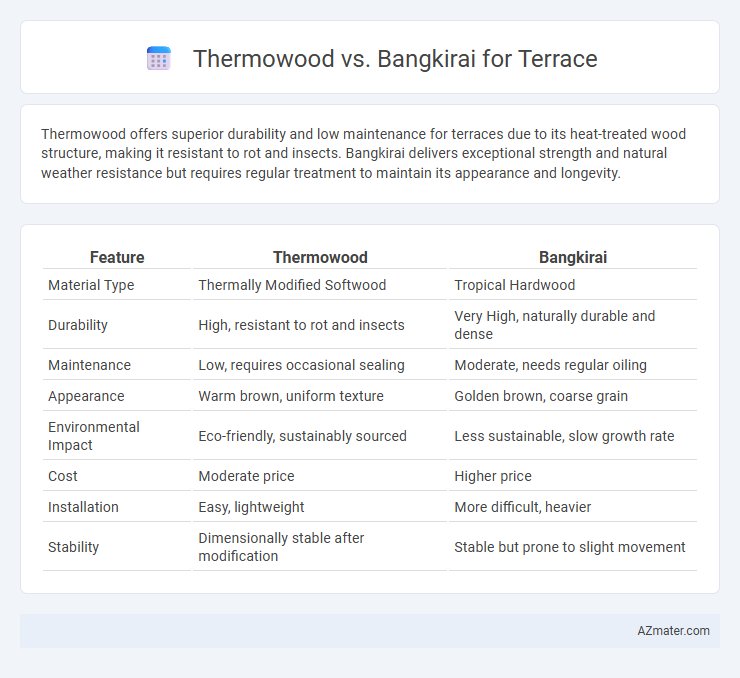Thermowood offers superior durability and low maintenance for terraces due to its heat-treated wood structure, making it resistant to rot and insects. Bangkirai delivers exceptional strength and natural weather resistance but requires regular treatment to maintain its appearance and longevity.
Table of Comparison
| Feature | Thermowood | Bangkirai |
|---|---|---|
| Material Type | Thermally Modified Softwood | Tropical Hardwood |
| Durability | High, resistant to rot and insects | Very High, naturally durable and dense |
| Maintenance | Low, requires occasional sealing | Moderate, needs regular oiling |
| Appearance | Warm brown, uniform texture | Golden brown, coarse grain |
| Environmental Impact | Eco-friendly, sustainably sourced | Less sustainable, slow growth rate |
| Cost | Moderate price | Higher price |
| Installation | Easy, lightweight | More difficult, heavier |
| Stability | Dimensionally stable after modification | Stable but prone to slight movement |
Introduction: Choosing the Right Wood for Your Terrace
Thermowood offers enhanced durability and stability through thermal modification, making it resistant to rot and insect damage, ideal for terrace use in varying climates. Bangkirai, a dense tropical hardwood, provides natural strength and rich color but requires regular maintenance to prevent weathering and cracking. Selecting between Thermowood and Bangkirai depends on balancing long-term durability, maintenance effort, and aesthetic preferences for your terrace flooring.
What is Thermowood?
Thermowood is a sustainable, heat-treated timber made from Nordic softwoods such as pine or spruce, enhanced through a controlled thermal modification process that improves durability, dimensional stability, and resistance to decay without chemicals. Compared to Bangkirai, a tropical hardwood naturally resistant to pests and moisture, Thermowood offers an eco-friendly alternative with reduced environmental impact and lighter weight, making it easier to handle and install for terrace construction. Its improved stability and resistance to weathering extend the lifespan of outdoor terraces while maintaining a consistent, warm wood appearance.
What is Bangkirai?
Bangkirai, a tropical hardwood native to Southeast Asia, is prized for its exceptional durability and resistance to weather, making it a popular choice for terraces and outdoor decking. Unlike Thermowood, which is thermally modified softwood enhancing decay resistance and stability, Bangkirai naturally contains oils and dense grain structure that provide strong protection against insects and moisture. Its rich golden-brown color and robust hardness result in long-lasting, low-maintenance terraces ideal for harsh outdoor environments.
Durability and Lifespan Comparison
Thermowood, treated through a heat modification process, offers enhanced durability and resistance to decay and insect attacks, making it highly suitable for terraces exposed to varying weather conditions. Bangkirai, a tropical hardwood known for its natural oils and dense grain, provides exceptional longevity and robust strength, often lasting over 25 years with proper maintenance. While Bangkirai inherently withstands outdoor elements due to its natural properties, Thermowood achieves similar durability through environmentally friendly processing, making both materials reliable choices for long-lasting terrace flooring.
Weather Resistance: Thermowood vs Bangkirai
Thermowood and Bangkirai both exhibit excellent weather resistance, making them popular choices for terraces exposed to varying climates. Thermowood undergoes a thermal modification process that enhances its dimensional stability, resistance to moisture, and decay, resulting in a low maintenance and durable decking material. Bangkirai, a tropical hardwood, offers natural resistance to rot, insects, and UV damage due to its high density and oily composition, providing longevity and robust performance in outdoor settings.
Maintenance Requirements
Thermowood requires minimal maintenance due to its heat-treated process, which enhances durability and resistance to decay, making frequent sealing or staining unnecessary. Bangkirai, a dense tropical hardwood, demands regular cleaning and periodic oiling or sealing to maintain its rich color and prevent surface checks or mildew. Choosing Thermowood reduces long-term upkeep costs, while Bangkirai's maintenance ensures its natural beauty and strength over time.
Aesthetics and Color Options
Thermowood offers a consistent warm brown color with a smooth, matte finish that enhances modern terrace designs, maintaining stability and color retention over time due to its heat-treated properties. Bangkirai showcases a rich, golden to reddish-brown hue with natural color variations and a coarse texture, providing a more rustic and traditional aesthetic appeal for outdoor terraces. Both materials offer distinct color palettes, where Thermowood suits minimalist, contemporary styles, while Bangkirai is ideal for vibrant, natural wood-focused outdoor spaces.
Sustainability and Environmental Impact
Thermowood is produced through a controlled heat treatment process that reduces moisture content, increases durability, and eliminates the need for chemical preservatives, making it a sustainable choice with a lower environmental impact compared to tropical hardwoods. Bangkirai, sourced from Southeast Asian rainforests, often involves deforestation and habitat disturbance, raising concerns about sustainability despite its natural resistance to decay. Opting for Thermowood supports eco-friendly forestry management and reduces carbon footprint due to its renewable origin and minimal chemical usage.
Cost and Value Analysis
Thermowood offers a cost-effective solution for terraces with moderate pricing and excellent durability due to its heat treatment process, which enhances resistance to decay and moisture. Bangkirai, a dense tropical hardwood, commands higher upfront costs but provides exceptional strength and longevity, making it a valuable investment for long-term terrace applications. Considering maintenance expenses and lifespan, Thermowood requires less frequent upkeep, while Bangkirai's robust nature can justify the initial premium through extended service life and aesthetic appeal.
Final Verdict: Which is Better for Your Terrace?
Thermowood offers superior durability and low maintenance due to its heat-treated process that enhances resistance to decay and insect damage, making it ideal for long-lasting terraces. Bangkirai provides a natural hardwood with excellent strength and a rich, warm appearance but requires regular treatment to prevent weathering and insect infestation. For a low-maintenance, eco-friendly terrace with extended lifespan, Thermowood is the better choice, while Bangkirai appeals to those prioritizing traditional aesthetics and natural hardness.

Infographic: Thermowood vs Bangkirai for Terrace
 azmater.com
azmater.com